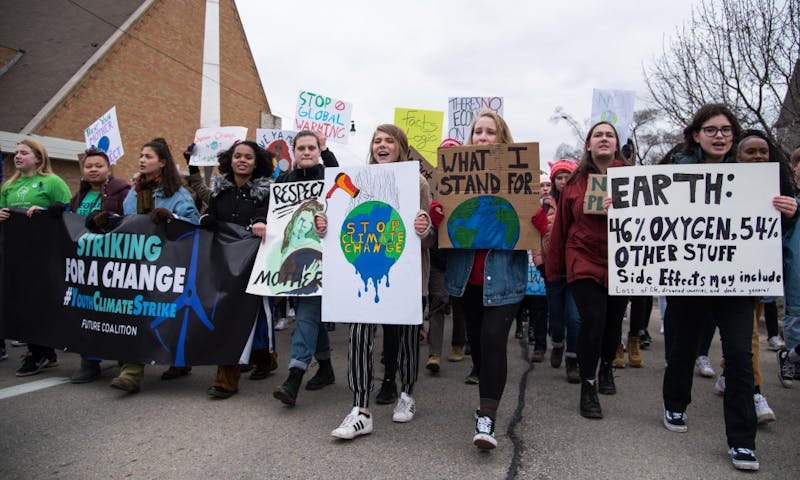
Madison students and community members protested in the March 15th climate strike happening around the globe.
Image By: Will Cioci
Madison students and community members protested in the March 15th climate strike happening around the globe.
Image By: Will CiociAs the 2020 presidential election approaches, candidates’ stances on climate policy are likely to take center stage.
Legislation like the Green New Deal has already been a catalyst for public debate. But citizens will be able to do more than discuss as they take to the polls to elect America’s next leaders.
Some of America’s youth, however, want more immediate action. For many high schoolers and college students nationwide, climate change will have direct effects on their future.
“Change needs to start now. It needed to happen years ago,” said Isabella Spitznagle, a junior at Madison West High School. “If we don’t start making changes, there will be no going back and this world won’t be the same world we leave.”
Spitznagle, among other youth activists around the world, took charge of the Youth Climate Strike on March 15.
“We have students from all over Wisconsin involved, from as far north as Ashland to as far south as Milwaukee. Our biggest audience is Madison, every major Madison school and the surrounding Madison area schools,” Spitznagle said.
Overall, people in 1,325 cities in 98 countries took part in the strike. The strike’s origin can be traced back to Greta Thunberg, a 16-year-old Swedish student who elected to skip school to bring attention to climate change, attracting hordes of supporters on the streets of Stockholm. From there, her actions gained further attention and eventually spread to the masses.
Back in Madison, students from a number of high schools marched to the State Capitol, waving banners and clad in shirts displaying messages urging climate reform. Several students and allies spoke to the crowd, including U.S. Rep. Mark Pocan, D-Wisconsin, an outspoken supporter of the Green New Deal and critic of President Trump’s 2017 decision to withdraw the U.S. from the Paris Climate Agreement. Afterward, the students left notes on state capitol officials’ doors, explaining their rationale for pushing climate reform.
“The end goal of the strike is to inspire youth to take action and create change to help the environment and ultimately fight climate change,” Spitznagle said. “While strikes are important, the real change comes after the strike through lobbying and passing [legislation].”
UW-Madison junior Hannah Kasun admires the high schoolers involved in such protests, and hopes the prominence of their voices will enact change.
“It is ... interesting to follow the climate action which is being led by high schoolers in Madison and around the world,” Kasun said. “it's very important that people in decision-making positions pay attention to these voices.”
Kasun is no stranger to the omnipresent mission of improving the environment in which we live. Rather, she makes it a central focus of her extracurricular involvement at UW-Madison. In addition to holding a position with UW-Madison’s Office of Sustainability, Kasun is the lead host and executive producer for Earthspeak Radio, a weekly show broadcast on WSUM.
She explained Earthspeak sets out to inform listeners on the overarching issue of climate change with a “fresh and local” perspective, doing so by inviting guests to speak on related topics. Earthspeak’s vision has yielded success and positive recognition, receiving a second place award in the General Entertainment category and third place award in the Public Affairs Talk Show category from the Wisconsin Broadcaster’s Association.
Kasun noted she believes it’s easiest to alter student perspectives regarding climate change prevention when they feel like they can take an active role in making change.
“In my experience, students are responsive when you not only highlight an issue, but also focus on how they can tangibly play a part in solutions to the problem,” Kasun said. “I believe that spreading the message that we're morally or physically doomed — as is often the subtext in environmental conversations — leads to inaction, and that negative messages need to be tempered with optimism in order to cultivate action.”
For Spitznagle, Kasun and scores of other folks on campus and around the world, this youth-driven influx in the ongoing climate change conversation is getting the ball rolling on reform.
“As someone who wants to build my career off being a climate activist, I want to look back at this moment and remember it as a beginning to a much larger, powerful movement,” Spitznagle said. “To know you have the opportunity to make a difference is a really powerful thing.”